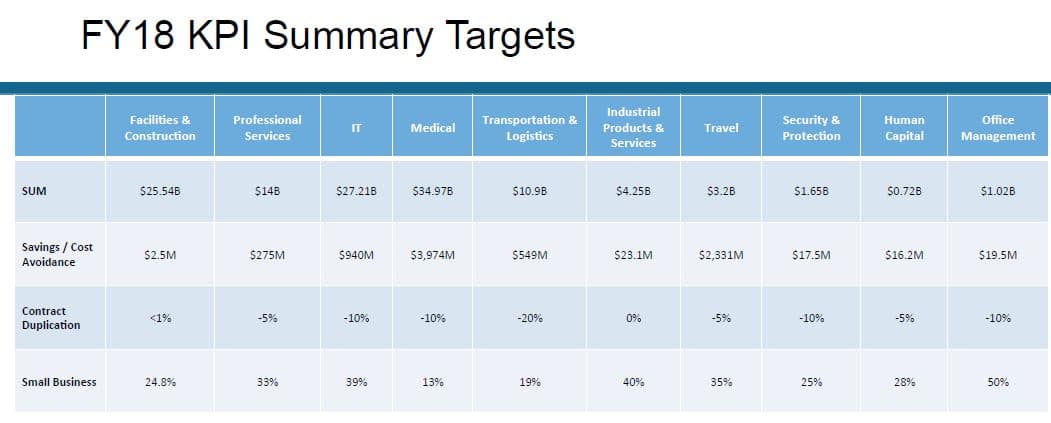

The Office of Federal Procurement Policy details new goals for category management in version 3 of the governmentwide strategy.
Best listening experience is on Chrome, Firefox or Safari. Subscribe to Federal Drive’s daily audio interviews on Apple Podcasts or PodcastOne.
This is part one of a two-part look at OFPP’s version 3 category management strategies. In next week’s Reporter’s Notebook, I’ll look at concerns by the small business community about the current and future impact category management could have on contracting.
The Office of Federal Procurement Policy has been trying to solve contract duplication for almost a decade.
OFPP required agencies to justify new multiple award contracts by submitting business cases. That had limited success.
OFPP tried to create catalogs of existing contracts so agencies could see what was out there first before going down the path of a new contract. That had even less success.
Now OFPP is trying to use category management and its subcategory best-in-class contracts to shrink the number of technology, professional services, transportation and logistics and seven other categories where the number of MACs has grown and grown for decades.
Each category manager developed new strategies for 2018 with goals across four broad areas. Without a doubt, reducing contract duplication and ensuring small businesses aren’t left behind are going to be the hardest to achieve.
The category management strategic plans version 3, which Federal News Radio obtained, details 2018 and 2019 goals for each of the 10 categories, including a 5 percent-to-20 percent reduction in the number of contracts that serve each specific area.
“Each of the categories is focused on increasing spend through best-in-class (BIC) solutions, which is what the category managers can work to influence by working with the agencies,” said Lesley Field, the acting OFPP administrator, in an email to Federal News Radio. “Agencies are held accountable for meeting the targets for BIC and spend under management (SUM).”
Field said among the goals the administration has set for 2020 is “a cumulative reduction of unnecessary duplicative contracts of 13 percent” out of the 425,000 contracts that are under what OFPP calls Tier 0 or unaligned spend that do not align or conform to category management principles.

The strategies don’t describe how OFPP will hold agencies accountable for the 13 percent reduction.
For example, under the professional services category the strategy calls for the leaders to “implement professional services supplier relationship management program; Services spend analyses completed for top five professional services spend agencies; and Administrative savings methodology adopted for the Professional Services Schedule.” Each of these areas has quarterly goals ranging from hosting supplier relationship management community of interest meetings or developing a forecast opportunities strategy, but there aren’t any specific assignments to people or agencies, or OFPP oversight details.
Jack Kelly, a former OFPP policy analyst, who spent 36 years in government, said in an interview that the issue the administration needs to solve is that no one wants to give up control of their contract, or their spend in a particular category.
“I think contract duplication needs to be more of focus than it is in 3.0 plan,” Kelly said after reviewing the strategies.
Joe Jordan, a former OFPP administrator during the Obama administration and now an independent consultant, said addressing contract duplication is a critical success criteria for category management.
“It’s extremely hard, but what needs to happen is for OFPP, GSA and others to look at the economics of contract providers. If they charge a fee on everything that goes through the contract, does that make sense? Are the economics right?” Jordan said. “At the end of the day, the two biggest challenges to reducing contract duplication are understanding the economics involved, particularly around the agencies receiving fees, and the human desire to have control. Too often acquisition professionals say, ‘Sure, some other agency can do most of what I want, but I like my agency, my buyers and our mission is different.’”
OFPP has had some positive results in which it worked with agencies to reduce duplicative contracts, such as for satellite communications where the Defense Information Systems Agency and the General Services Administration partnered on the Future Commercial Satellite Communications (COMSATCOM) Services Acquisition in 2012.
Additionally, Bloomberg Government reported in 2017 that the number of multiple award contracts dropped by 239 over the last five years, while spending continues to increase to over $111 billion a year.
But as category managers saw in 2017 when only two of 10 categories came close or accomplished their contract duplication goals, there are more examples of contract duplication than not.
These strategies mark a return of sorts for category management. Over the first 15 months of the Trump administration, there has been little public attention to category management — no new polices, the draft circular from October 2017 seems to have fallen by the wayside and only some basic references by Field or other OFPP executives at conferences.
OFPP floated a draft category management policy last fall, but it seems to be stuck in place.
But with the approval of the strategic plans and the release of the President’s Management Agenda, the administration finally is putting its support behind the initiative, despite still no permanent OFPP administrator and no one coming in the next six months either — the time it takes for someone to be nominated and go through the Senate confirmation process.
Overall, the goals for category management are straightforward and lofty
“The strategy of category management is focused on reducing costs and increased use of best-in-class solutions, as well as reducing duplication, improving communications through vendor management, sharing transactional data to inform better procurement and maximizing small business participation,” said Stacy Riggs, the acting director for Category Management governmentwide program management office, said in an email to Federal News Radio.
Field said the administration expects to reach $18 billion in cumulative cost avoidance, over a baseline of $5.8 billion in 2016, bring 60 percent of common spend under management, an increase over the baseline of 44 percent, and increase the total addressable spend through best-in-class contracts to 40 percent from a baseline of 10 percent in 2016.
“OMB and the Category Management Leadership Council (CMLC) developed a spend under management tiered maturity model to help agencies evaluate their progress in aligning common spend activities with category management principles,” Field said. “The model is designed to be a living management tool that can be refined by OMB, in consultation with the CMLC, based on experience and best practice.”
Kelly said the strategies and goals, generally speaking, seem to hit all the right notes, but OFPP needs to put a finer point on the spend under management data.
“It’s hard to tell how much is really spent under management. If the goal is to reduce unmanaged spend and increase the use of best-in-class contracts, but there isn’t anything that talks about what percentage or how much isn’t managed,” he said. “When you run those numbers, for example under facilities and construction less than 0.01 percent is not managed, but that’s still a lot of dollars, but low percentage. There are definitional challenges and I’m not sure how it will be handled. For instance, how do you count blanket purchase agreements (BPAs) versus indefinite delivery, indefinite quantity (IDIQ) contracts? IDIQs are a license to buy, but the actual contracts are against BPAs.”
At the same time, Kelly said the savings numbers also are concerning because too often the data isn’t accurate enough to show the difference in costs.
Jordan added that he too has some concerns about the savings numbers. But instead of worrying about having the right data or all the data, agencies should move forward with what they know and figure out how best to reduce costs without focusing on specific percentages.
“I’m not sure this is the best place to spend their energy on precise percentages,” he said. “This is why I retain hope that category management will make a difference by presenting clear data about what’s going on. If you can show how much people are paying through various vehicles, you can create the natural ‘shark tank’ effect and make dispassionate arguments that this vehicle is providing equal but lower prices. Right now, there isn’t enough objective data, but I think given how much focus OFPP, GSA and the BIC managers have put in collecting good and more robust data within these categories, I retain hope that this will be one of several positive outcomes.”
Copyright © 2024 Federal News Network. All rights reserved. This website is not intended for users located within the European Economic Area.
Jason Miller is executive editor of Federal News Network and directs news coverage on the people, policy and programs of the federal government.
Follow @jmillerWFED



